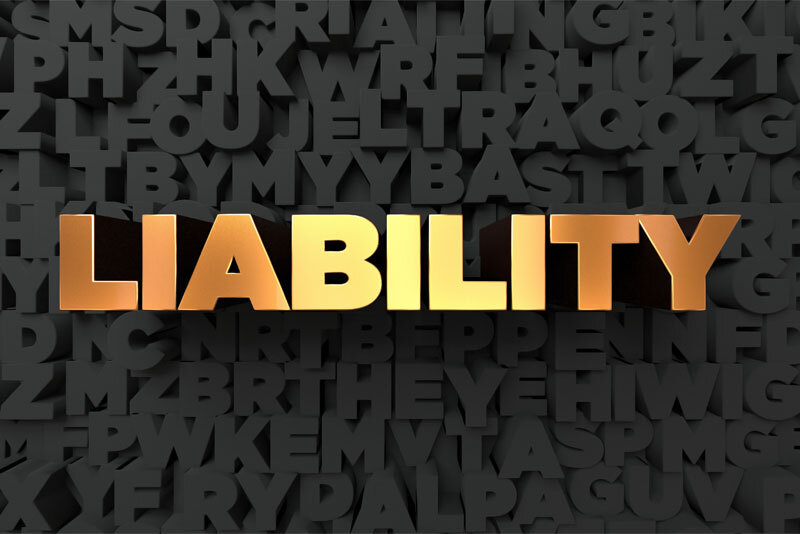Did you structure your business as a corporation or LLC for limited liability protections? For most scenarios the extra filing requirements, paperwork and fees are worth it—your personal liability protection helps make sure your assets are protected from the business’s debts and legal issues. And that goes for the corporation’s shareholders and LLC members, too. Creditors can’t come after members’ cars, houses or personal possessions to pay for attorney fees and unpaid invoices.
But it’s called limited liability, which means there are some notable exceptions. Here’s what to know and how to protect your business and your personal belongings.
Crossing the Line of Protection
Business owners of corporations and LLCs benefit from personal liability protection for most business transactions, but this protection is not absolute. There are circumstances where a business owner can be personally at risk.
Examples where personal liability protection is at risk:
- An owner or member personally and directly injures someone.
- An owner or member personally guarantees a business loan or debt that the corporation or LLC then fails to pay.
- An owner or member neglects to pay the required taxes withheld from employees’ wages.
- An owner or member intentionally does something fraudulent, illegal, or irresponsible that harms the company or a person.
- An owner or member treats the corporation or LLC not as a separate entity, but as an extension of his or her personal activities.
The reason corporations and LLCs enjoy limited liability protection is because the business is legally a separate and distinct entity. If the owner fails to treat the business as a separate entity (whether financially or otherwise) the lines are crossed, and they have forfeited their protections. Just setting up the business as an LLC or corporation is not enough. Owners must be in compliance with the rules and regulations required by the state in which the business operates.
Operating as a Separate Entity
Although exact requirements vary by state, C Corporations and LLCs are generally expected to follow the required protocol to keep their businesses in good standing (and therefore defendable as a separate entity).
C Corporations
- Choose a separate business name and register the name in the state. You’ll need to do a corporate name search to ensure the name is available in the state.
- Select a Board of Directors and officially assign roles.
- File Articles of Incorporation (also called Certificate of Incorporation) with the state which formally registers the business as a legal entity in the state.
- Obtain an Employee Identification Number (EIN) (also called Federal Tax ID Number) from the IRS. You don’t need to have employees to obtain this number. Getting an EIN is important because it gives your business a separate identification number for banking and tax filing purposes.
- Draft and adopt bylaws. Corporate bylaws define the purpose of the corporation and outline how it will operate, including the responsibilities and duties of the officers. Even if bylaws are not required by your state, they are a good idea to have to further support the business’s separate identity.
- Hold Board of Directors meetings. After the initial meeting of the board which covers the appointing of the officers, adoption of the bylaws and more, the corporation must establish a schedule for regular meetings (even if it’s only once a year). Minutes must be recorded, approved and signed at each meeting.
- Due diligence to shareholders. If the corporation has shareholders, the corporation must record shareholders’ names, contact information and comply with all securities laws of the state.
- Submit a Statement of Information report. If your state requires a Statement of Information, the initial report will simply have the names of managers, directors, and members of a company. Going forward, however, the report would require such information as accounting policies, financial statements, an overview of operations and any auditor reports.
- Obtain all required federal and local business licenses and permits.
Once you have registered your company name and obtained a tax ID number, you’ll need to open a corporate bank account under the corporation’s name. This account is where all company business must be transacted including invoicing, payables and receivables, IRS filings and more. Never should a personal transaction be conducted using the corporation’s bank account.
Limited Liability Company (LLC)
Like a corporation, a Limited Liability Company (LLC) allows owners to keep the business as a separate entity and provides limited personal liability protection if the LLC stays compliant and in good standing. An LLC is simpler to form and maintain than a corporation. Owners/shareholders are called members and the LLC can be formed as either a single-member LLC or a multi-member LLC and can be either member-managed or manager-managed.
LLCs are popular because they allow greater flexibility in the management and financial operations of the company. If the company is member-managed, the owners run the daily operations. If the company decides to appoint a manager, the LLC can either appoint one of the members to be the manager or hire someone from the outside. LLCs can also choose their tax treatment and can be taxed as a corporation or as an S Corp, which allows members to have pass-through taxation but with the corporate benefit of a reduced self-employment tax burden. Learn more about the S Corporation election here.
To stay in good standing as an LLC, the company must:
- File Articles of Organization with the state. Similar to the Articles of Incorporation, an LLC’s Articles of Organization establishes the LLCs name, business structure, and names of the LLC members.
- Obtain an EIN/Tax ID number.
- Create an Operating Agreement. Like corporate bylaws, the operating agreement defines the roles and responsibilities of its members and managers.
- Acquire federal and local business licenses and permits.
- Open a business bank account.
Although ongoing compliance requirements vary by state, it’s important to meet all tax filing deadlines, renew all required permits, file required annual reports with the secretary of state and keep the state apprised of any significant developments within the LLC, such as address and/or member changes.
Added Protection
We can’t stress enough how important it is to keep your business and personal finances and activities separate. Never misrepresent facts or data to the government, vendors or creditors. It’s also a good idea to obtain extra protections with the correct business insurance policies. Check with your insurance company to see what liability policies can further protect your personal assets in the event you’re taken to court for a situation in which your limited liability protections aren’t enough.
How can CorpNet help provide you with personal liability protection and keep your business in compliance? Reach out today for a free business consultation and let’s chat about how we can help protect you and your company.





